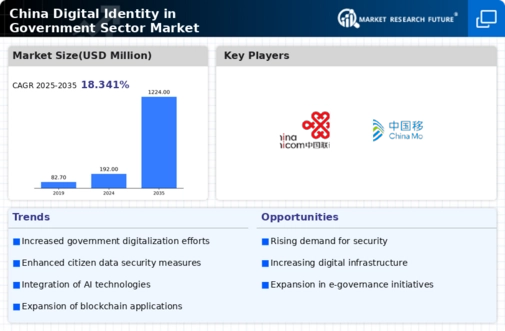Rising Cybersecurity Concerns
As cyber threats continue to evolve, the need for robust cybersecurity measures has become paramount in China. The digital identity-in-government-sector market is experiencing growth due to increasing concerns over data breaches and identity theft. In 2025, it is estimated that cybercrime could cost the Chinese economy over $100 billion annually. This alarming trend has prompted government agencies to prioritize the implementation of secure digital identity solutions. By adopting advanced technologies such as biometrics and encryption, the government aims to protect sensitive citizen data and maintain public trust. Consequently, the heightened focus on cybersecurity is likely to drive investments in digital identity systems, thereby fostering growth in the digital identity-in-government-sector market.
Increased Demand for E-Government Services
The demand for e-government services in China is on the rise, driven by the need for more efficient and accessible public services. Citizens increasingly expect seamless online interactions with government agencies, which necessitates the implementation of effective digital identity solutions. In 2025, it is projected that over 70% of government services will be available online, highlighting the critical role of digital identity in facilitating these services. The digital identity-in-government-sector market is poised to benefit from this trend, as secure and user-friendly identity verification systems are essential for ensuring smooth access to e-government platforms. This shift towards digital services not only enhances citizen satisfaction but also streamlines government operations, further propelling the growth of the digital identity-in-government-sector market.
Government Initiatives for Digital Transformation
The Chinese government has been actively promoting digital transformation across various sectors, which significantly impacts the digital identity-in-government-sector market. Initiatives such as the 'Digital China' strategy aim to enhance the efficiency and transparency of public services. By 2025, the government plans to invest approximately $1 trillion in digital infrastructure, which includes the development of secure digital identity systems. This push for modernization is likely to increase the adoption of digital identity solutions, as they are essential for streamlining processes and improving citizen engagement. Furthermore, the integration of digital identity systems is expected to facilitate better data management and enhance the overall security of government services, thereby driving growth in the digital identity-in-government-sector market.
Legislative Support for Digital Identity Frameworks
The Chinese government has been establishing a legislative framework to support the development and implementation of digital identity systems. Recent regulations emphasize the importance of secure identity verification processes in public services. This legal backing is crucial for fostering trust among citizens and encouraging the adoption of digital identity solutions. By 2025, it is anticipated that comprehensive regulations will be in place, providing guidelines for data protection and privacy in the digital identity-in-government-sector market. Such legislative support is likely to stimulate investment in digital identity technologies, as government agencies seek to comply with new standards and enhance their service delivery capabilities.
Technological Advancements in Identity Verification
Technological advancements are playing a pivotal role in shaping the digital identity-in-government-sector market in China. Innovations such as artificial intelligence, machine learning, and blockchain technology are enhancing the capabilities of identity verification systems. These technologies enable more accurate and efficient identity checks, which are essential for government services. In 2025, it is expected that the integration of these advanced technologies will lead to a more streamlined and secure digital identity process. As government agencies seek to improve service delivery and reduce fraud, the demand for sophisticated identity verification solutions is likely to increase, thereby driving growth in the digital identity-in-government-sector market.
















